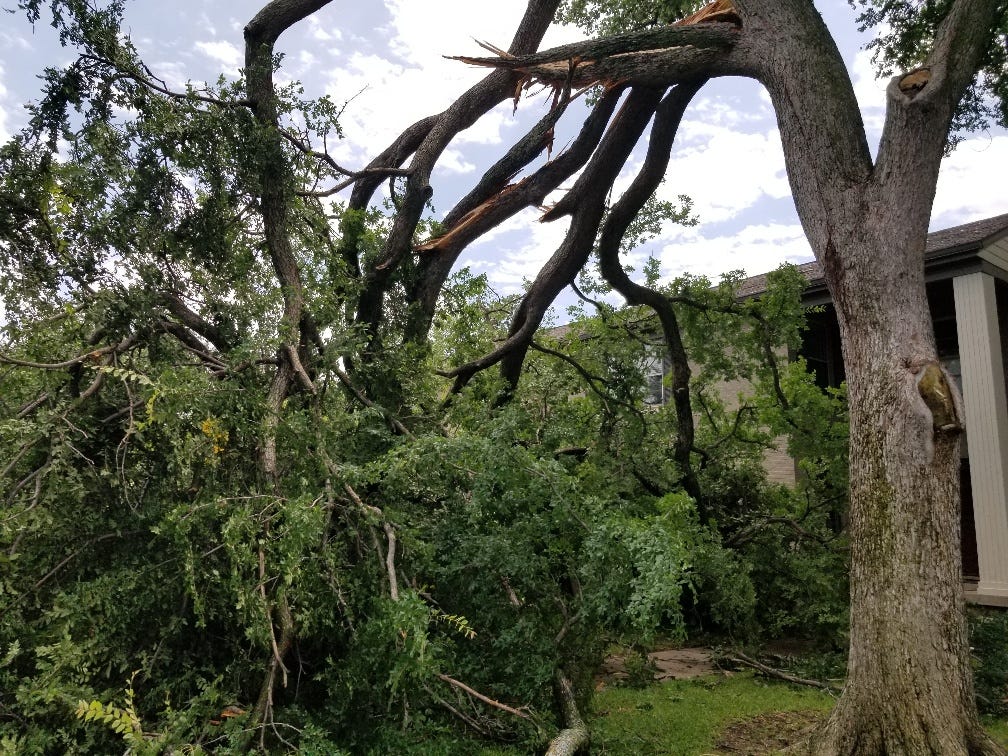When I Am Among the Trees by Mary Oliver
When I am among the trees,
especially the willows and the honey locust,
equally the beech, the oaks and the pines,
they give off such hints of gladness.
I would almost say that they save me, and daily.
I am so distant from the hope of myself,
in which I have goodness, and discernment,
and never hurry through the world
but walk slowly, and bow often.
Around me the trees stir in their leaves
and call out, "Stay awhile."
The light flows from their branches.
And they call again, "It's simple," they say,
"and you too have come
into the world to do this, to go easy, to be filled
with light, and to shine."
I cannot stop thinking about Mary Oliver’s poignant tribute to trees.
The serenity of this gorgeous poem is a stark contrast to the horrifying post-tsunami scenario we have suffered in Dallas this week. Once uniquely abundant and lush, my mid-century condo community is a shambles. We tragically lost dozens of our most spectacular trees — split, crushed, and toppled by Mother Nature’s sudden fit of rage. Sadly, they were particularly vulnerable due to inconsistent pruning practices over the years, but we were not alone. Innumerable trees across Dallas succumbed to the ferociously fickle gale-force winds.
With their towering majesty and grace, my massive front yard trees have “saved me, and daily” for nearly two years — until Tuesday. Granted, the relationship is often complicated — with my enormous cottonwood’s annual spray of sticky cotton fluff that festoons my HVAC unit, deck, and nose. Still, it’s profoundly distressing to absorb the devastation wrought by these capricious winds that shook my condo to the studs — as the sirens wailed and the weatherstripping howled.
My sprawling elm took the biggest hit — cracked in half and peeled apart, exposing her splintered limbs like broken bones. Though she stood tall for decades and weathered countless storms, she could not withstand the formidable stress of her own overgrowth this time. Such fragile strength and debilitating density. Gone in an instant.
I think I can identify on some level.
The enormity of the debris’ impact is intensely disturbing because “I am so distant from the hope of myself.” Someone commented on the photo I posted on Facebook, “They become part of your landscape.” How true — physically and spiritually. Oliver says, “Around me the trees stir in their leaves and call out, ‘stay awhile.’”
Indeed, they have.
Maybe this weather crisis that jolted me out of bed and into the powder room with my cat at dark thirty uncovers buried branches of unprocessed trauma — ancient and recent. After all, grief has a gnarly way of sneaking up on you — conflating and surprising. Grief triggers grief, and losses intertwine like the tangled, lichen-coated twigs of my weary trees.
Maybe it works like an episode of This is Us that suddenly makes you sloppy sob. It’s revealing the associated trauma you maybe haven’t permitted yourself to feel, the vulnerability you have not allowed yourself to expose — to yourself or anyone else.
And on top of all that, my heart continues to ache for those who have sustained catastrophic damage, injury, and loss, as well as those still struggling without power. These are challenging times, and I believe Earth is weeping under the accumulated weight of environmental agony.
But I will do my best to look to the leaves that remain — “to be easy, to be filled with light, and to shine.” Always wondering what Elliot would say . . .






Wow - tears in my eyes - the poem is so beautiful as are your words. Thank you 🙏
Exquisite language; rolling waves of confluences and syntheses; punch-me-in-the-gut truth, expressed with fervor and beauty; plus courage: a gift to your readers.
This is my favorite poem; I will treasure it even more, for what you have shared. Nan